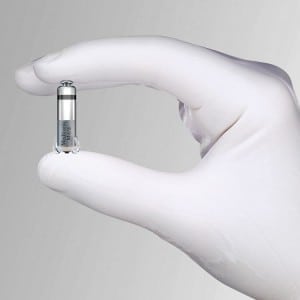Lexington Medical Center becomes first hospital in South Carolina to implant Micra™ Wireless Pacemaker
March 14, 2017Lexington Medical Center has become the first hospital in South Carolina to implant a new wireless pacemaker known as Micra™ into a patient to fix a slow heartbeat. Called the world’s smallest pacemaker, this device is not visible under the skin, and because there are no wires connected to it, there is a lower risk of complications. The Lexington Medical Heart Center team performed this pacemaker implantation inside the hospital’s cardiac electrophysiology lab on March 14, 2017.
“This device represents a significant breakthrough in pacing technology,” said William W. Brabham, MD, FHRS, of Lexington Cardiology, a Lexington Medical Center physician practice. “The ability to deliver pacing therapy using such a small device is revolutionary. It’s very exciting to think of the possibilities in the future.”
A pacemaker helps restore a healthy heart rhythm by sending tiny electrical signals to the heart to increase the heart rate. Traditionally, pacemakers have been implanted below the collarbone through an incision and have included leads, which are insulated wires. The leads carry the electrical impulse from the pacemaker to the heart.
The size of a vitamin capsule, Micra is more than 90 percent smaller than other pacemakers. It’s implanted in a minimally-invasive procedure through a vein in the leg directly into the heart, removing the need for leads to act as pulse generators and the appearance of any visible scar below the collarbone. Because leads in traditional pacemakers may shift, there is a small risk of those devices not working properly when needed; with no leads, Micra eliminates that concern. Also, its size and location can mean fewer post-implant activity restrictions and no obstructions to shoulder movement.
Manufactured by Medtronic, Micra is the first FDA-approved wireless pacemaker. It’s for patients who need a single chamber pacemaker. The device has more than a 99 percent implant success rate and 48 percent fewer major complications reported than with traditional pacemakers.
The Lexington Medical Heart Center team has received extensive training on proper device implantation. Dr. Brabham and Robert Malanuk, MD, FACC, performed the first Micra implantation at the hospital
For more information on Lexington Medical Center’s comprehensive cardiovascular care program, visit LexMed.com/Heart.














